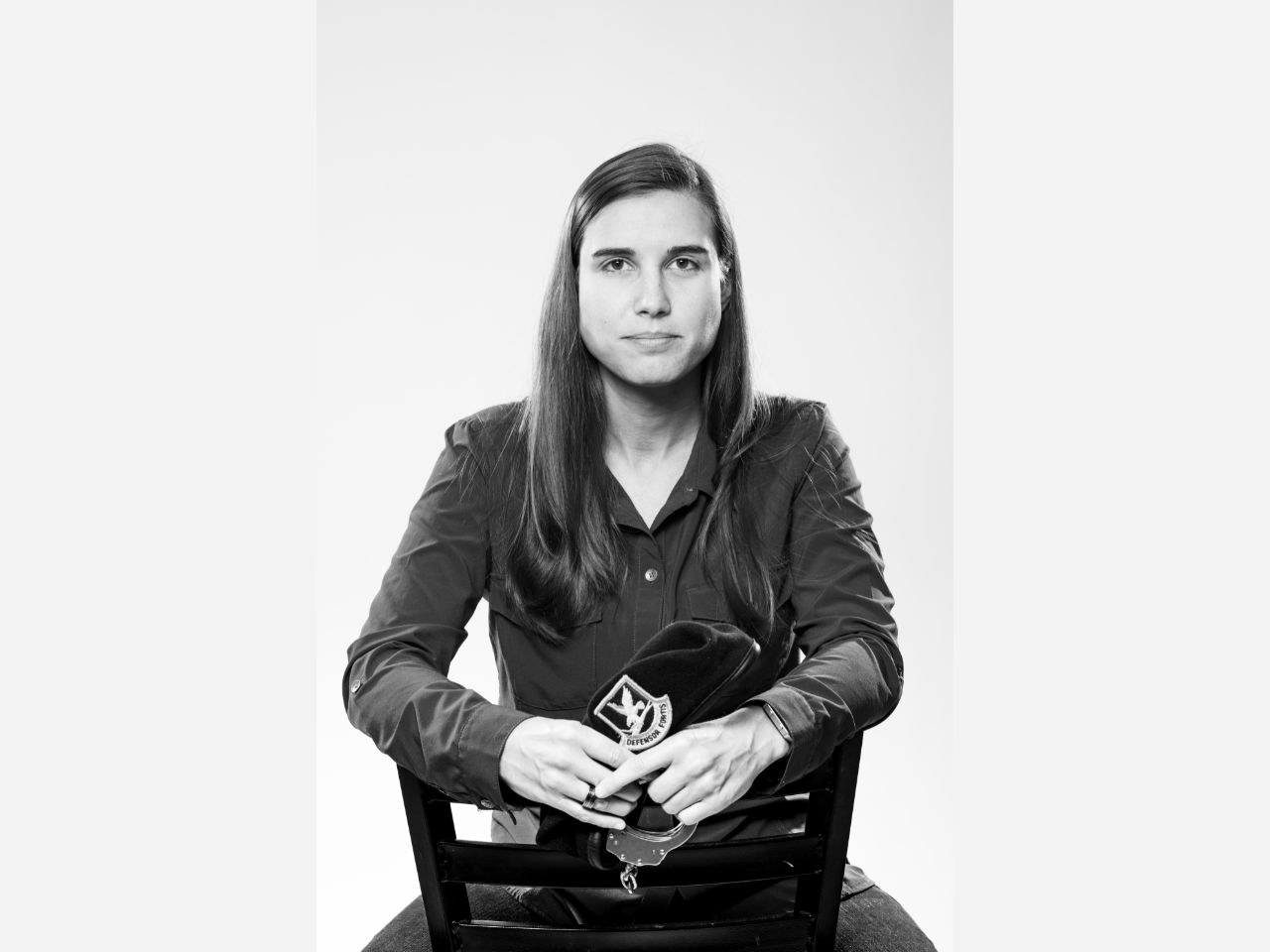Branch: Air Force
Duty: Security Forces
By Emily Wunderlich
Courtney Smith was at the dawn of her career when she was honorably discharged from the Air Force in 2008.
“I got out in February. I would’ve sewn on (the patch for) senior airman in March. And then I would’ve deployed that spring to Iraq,” she said. “I had every intention to do 20 years, or a minimum, my contract.”
As an E-3, or airman first class, Smith’s job in security forces required her to carry 55 pounds of gear, which took a toll on her back and eventually caused nerve damage. What was supposed to be a six-year enlistment was cut short to two.
“I always say it’s the straw that broke the camel’s back,” she said. “It wasn’t like I was shot or anything; it’s not that dramatic … I have friends that lost their lives in Iraq, and I have friends that are in wheelchairs, so I’m pretty fortunate to walk away with what I have.”
Although Smith said she still feels “robbed” under the circumstances, she still loves the Air Force and security forces.
“It wasn’t just me, there were other airmen getting booted for similar reasons across the board,” she said. “They discharged a ton of personnel because they were trying to save money to build a new plane that they never built.
“Now I see all these new troops getting out, and they have all (the) benefits that people at my time didn’t have. And it makes me feel good. It makes that resentment kind of dissipate, because at least something good has come out of that period.”
She also found comfort in knowing that Stacy Pearsall, the photographer and founder of the Veterans Portrait Project, shared a similar story.
“We both had that moment of clarity during the pictures,” Smith said. “That’s why I look so angry in them.”
Smith, now 32, guarded Boeing B-52s, the oldest planes in Air Force history, originally commissioned during the Korean War.
“They look like they’re going to crash every time they take off,” she joked.
Working 12- to 15- hour shifts, she often responded to IFE’s, or in-flight emergencies — a majority of which were caused by bird strikes or landing gear malfunctions.
“You have to race the firefighters down the flight line, which is exciting because you always lose,” she said.
She recalled when a plane from Minot Air Force Base in North Dakota landed at her base in Barksdale, Louisiana. The plane was carrying nuclear weapons without authorization.
“Once you take command of that plane, you have to have it manned 24/7,” she said. “You are married to that aircraft.”
As a result, security forces had to secure the area, the personnel and the aircraft as they underwent a monthlong investigation.
“Nothing ever happens, thankfully, but you never know,” she said.
Family inspiration
Smith cited three reasons for her decision to enlist: family tradition, service to her country, and “your typical ‘I didn’t know what I wanted to be when I grow up.’”
“I wanted to go to art school for photography. But realistically, that that wasn’t going to pay the bills,” she said.
Hearing her father’s and grandfather’s stories of service inspired Smith to make stories of her own, like drifting in a Humvee during a tropical storm and watching another airman run over a radio because the battery didn’t work.
“I always tell people you can tell if they’re bullshitting their military career if all their stories are just like war and guts,” she said.
But it wasn’t all fun and games, Smith said.
“I learned when to shut up. Being a smartass doesn’t help you when you’re in the military,” she said.
The camaraderie between her and her fellow airmen lasted long after her time in the service.
“It’s literally like you never stopped talking. The jokes are still there,” she said. “It’s cool to see them succeed either in the Air Force or outside the Air Force.”
After her medical discharge, Smith moved back home to Iowa, where she said there was an “awful veterans support system.”
“I was just so depressed and I thought the only way for me to get happy was to look for the future,” she said.
Although she didn’t yet have a place of her own, she found herself at Furniture Row, looking for a TV stand and maybe a couch for her future home. She found both and left with something more: a job.
“The owner of that company … was a Vietnam veteran, and so that whole structure fit nicely in with the military structure,” she said. “I ended up getting one of the fastest promotions.”
Smith worked at Furniture Row for two years before finding a new job at Verizon, where she said she saw herself spiraling into depression. That was when she moved to Florida with her mom, transferred to a Verizon store in Tampa, went to personal training school, and “started seeing the purpose again.”
“One of the instructors that trained me was like, ‘You know you’re not a personal trainer. You’re bigger; you could be a doctor,’” Smith said.
So she attended Hillsborough Community College, where she established a veterans club where students could vent their problems and do their homework.
When she arrived at USF St. Petersburg, the Military and Veterans Success Center was just weeks away from coming to fruition. Smith was a regular attendee before she was hired as a peer counselor. She was even on the committee that helped decorate the walls with pictures of service members.
“I think transition is probably the biggest takeaway, regardless of your rank, time and reason for getting out,” she said. “I think you honestly need to have a better support system. And luckily, USF St. Pete is doing that on multiple levels.”
Before she graduated, Smith interned at two hospitals. Now, she’s taking a gap year to earn clinical hours before applying to physician assistant school in the spring.
“Nothing would give me greater pleasure than taking that crap situation, going through this journey that took forever, and then becoming a PA and being able to assist other people that are in similar situations, whether they’re civilian or not,” she said.
Smith considers her core values to be service before self, perseverance, and adapting to change.
“It all sounds super cliche because it is, but it’s true,” she said. “You’re put in a position where things aren’t always going to work. But you have to figure out how to make it work.”
Photo courtesy of Stacy Pearsall (resized for web)



